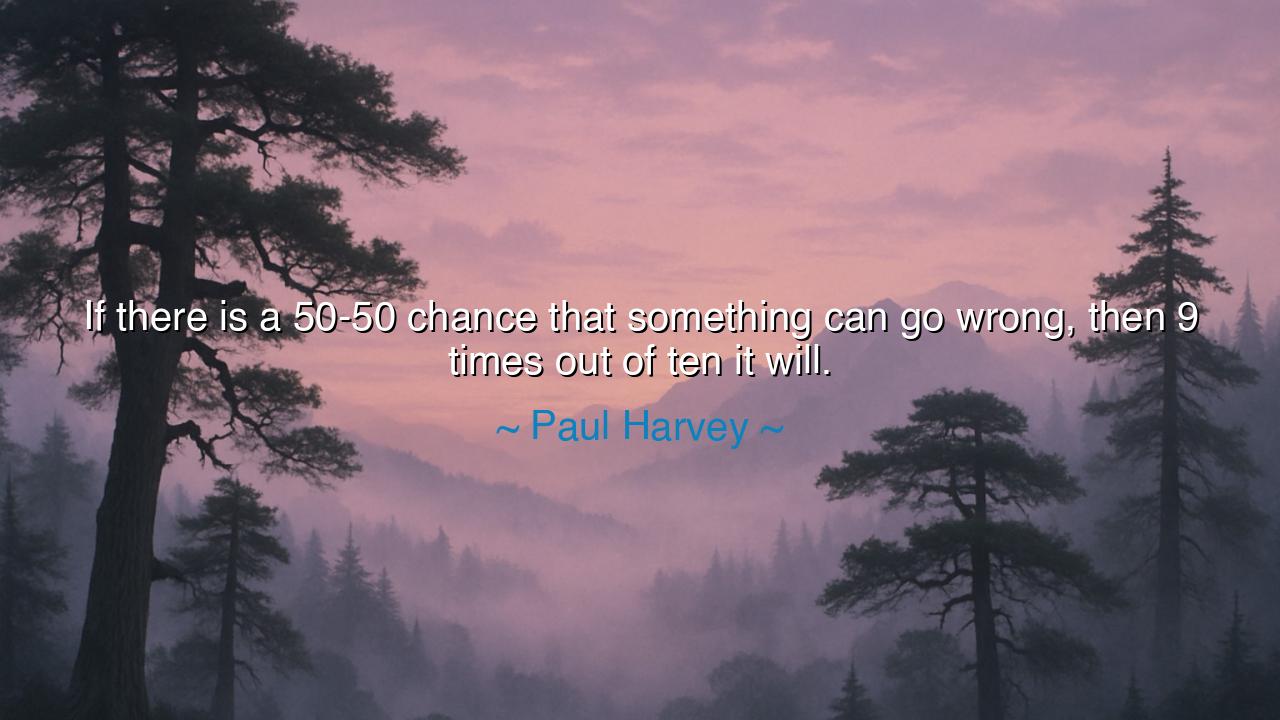
If there is a 50-50 chance that something can go wrong, then 9
If there is a 50-50 chance that something can go wrong, then 9 times out of ten it will.






Opening Scene
The room is dimly lit, the soft glow of a desk lamp casting long shadows across the floor. Outside, the world is quiet, the hum of the city fading as evening sets in. Jack sits at the table, looking at his laptop but clearly distracted, his fingers lightly tapping on the keyboard. Jeeny stands near the window, arms loosely crossed, gazing out into the distance. The atmosphere feels thoughtful, as if both are reflecting on something deeper.
Host: After a few moments, Jeeny turns from the window, her voice calm but filled with curiosity, breaking the silence.
Jeeny: “I came across a quote by Paul Harvey that made me laugh but also made me think. He said, ‘If there is a 50-50 chance that something can go wrong, then 9 times out of ten it will.’ It got me thinking about how much we expect things to go wrong in life, even when the odds are seemingly even. We always seem to expect the worst. Why do you think that is?”
Jack: “It’s funny, right? But there’s also a kind of truth in it. We’ve all experienced those moments when something goes wrong, and it feels like the odds were against us, even when the chances were 50-50. Maybe it’s a reflection of how cautious we are as humans. We often expect the worst, anticipating failure or difficulty even before we start. It’s almost like we prepare ourselves for the worst-case scenario.”
Jeeny: “Exactly. I think it’s part of being human — we tend to focus on the negatives. It’s like our brains are wired to imagine what can go wrong, because, in some ways, it helps us prepare. But then, it almost becomes a self-fulfilling prophecy. If we expect something to go wrong, we start making decisions that actually make it more likely to go wrong.”
Jack: “Yeah, it’s like we’re subconsciously drawing attention to the risks, and in doing so, we make them more likely to happen. It’s counterproductive, in a way. Harvey’s point is interesting because it’s almost like he’s poking fun at how pessimistic we can be. A 50-50 chance is a fair shot, but somehow, we expect failure to happen more often.”
Host: The conversation continues, the weight of their reflections deepening. Jack sets aside his laptop, his expression more serious as he considers the broader implications. Jeeny moves closer to the table, her voice steady as she continues.
Jeeny: “Maybe it’s because we want to be prepared for the worst. It’s like we’re guarding ourselves against disappointment or frustration. But in doing that, we create this environment where we’re always focused on what could go wrong, and that mindset can hold us back from taking risks or fully embracing opportunities.”
Jack: “Right. It’s a mindset of self-protection. We’re afraid of failure, so we overthink the possibilities. But Harvey’s quote is a reminder that sometimes the odds aren’t as bad as we think they are. It’s about taking chances without being overly consumed by the idea of failure. It’s not to say we should ignore the risks, but we shouldn’t let them paralyze us either.”
Jeeny: “Exactly. If we’re always waiting for something to go wrong, we miss out on the chances where things can go right. It’s like we’re never fully present in the moment, always anticipating what might happen next instead of engaging with what’s happening now. If we expect failure, we might end up creating it ourselves.”
Jack: “And that’s the paradox. By focusing on the negatives and preparing for the worst, we often end up manifesting the very thing we’re trying to avoid. If we had a bit more trust in ourselves and the process, maybe we’d actually be more successful. Harvey’s quote is almost a reflection of how we hold ourselves back by expecting failure.”
Host: The room grows quieter now, the weight of their conversation settling in. Outside, the city continues its usual rhythm, but inside, Jack and Jeeny share a realization: our minds are often quick to assume failure, especially when we’re faced with uncertainty. But sometimes, the key to success is not in avoiding risk but in embracing it without the weight of pessimism holding us back.
Jeeny: “So maybe the lesson here is about shifting our perspective. Instead of expecting things to go wrong, maybe we need to start trusting that things can go right, even when there’s a 50-50 chance.”
Jack: “Exactly. It’s about trusting the process and not letting fear of failure dictate our actions. Life is full of uncertainties, but that’s also where the opportunity lies — in taking those chances, in not always assuming the worst.”
Host: As the evening deepens, the conversation winds down with a quiet understanding. Life’s challenges are often unpredictable, but the fear of failure doesn’t need to dominate our decisions. By shifting our focus and trusting ourselves, we can navigate the 50-50 chances with a clearer mindset — one that embraces possibility rather than anticipating disaster.






AAdministratorAdministrator
Welcome, honored guests. Please leave a comment, we will respond soon